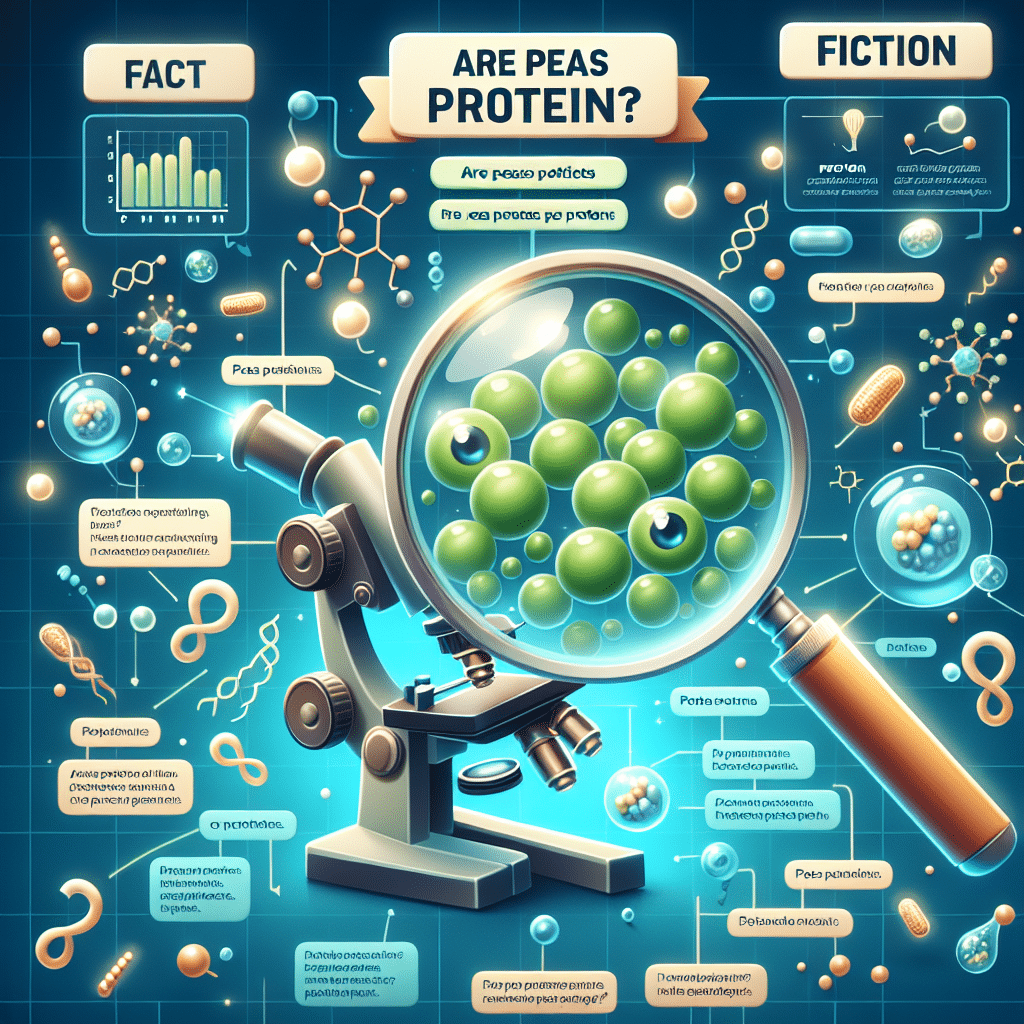Are Pea Peptides Proteins: Exploring the Facts
-
Table of Contents
Are Pea Peptides Proteins: Exploring the Facts

Pea protein has gained significant popularity in recent years as a plant-based alternative to animal-based proteins. It is known for its high protein content, amino acid profile, and various health benefits. However, there is some confusion surrounding the classification of pea peptides. Are they proteins or something else? In this article, we will explore the facts and shed light on this topic.
Understanding Pea Protein
Pea protein is derived from yellow peas, also known as Pisum sativum. It is a complete protein, meaning it contains all nine essential amino acids that the body cannot produce on its own. This makes it an excellent choice for vegans, vegetarians, and individuals with dietary restrictions.
Pea protein is commonly used in protein powders, bars, and other food products. It is easily digestible and has a high bioavailability, meaning the body can efficiently absorb and utilize the protein. Additionally, pea protein is hypoallergenic, making it suitable for individuals with allergies or sensitivities to other protein sources.
Pea Peptides: A Closer Look
Pea peptides are smaller fragments of proteins that are derived from pea protein. During the production process, enzymes are used to break down the larger protein molecules into smaller peptides. These peptides can vary in size and composition.
Pea peptides are often marketed as a separate product from pea protein, highlighting their unique properties and potential benefits. They are typically used in supplements and functional foods, claiming to support muscle recovery, improve exercise performance, and promote overall health.
Are Pea Peptides Proteins?
The classification of pea peptides as proteins is a subject of debate among experts. While peptides are derived from proteins, they are not considered proteins themselves. Proteins are made up of long chains of amino acids, whereas peptides are shorter chains.
Peptides can be considered precursors to proteins, as they are formed during the digestion and breakdown of proteins. They play important roles in various biological processes and can have specific functions in the body.
However, it is important to note that not all peptides are created equal. The composition and size of peptides can vary, and their specific effects on the body may differ. Some peptides may have bioactive properties, meaning they can interact with cells and tissues to produce specific physiological effects.
The Benefits of Pea Peptides
While pea peptides may not be classified as proteins, they can still offer certain benefits. Some studies suggest that specific pea peptides may have antioxidant, anti-inflammatory, and antimicrobial properties.
For example, a study published in the Journal of Agricultural and Food Chemistry found that certain pea peptides exhibited antioxidant activity, which can help protect against oxidative stress and reduce the risk of chronic diseases.
Another study published in the Journal of Functional Foods showed that pea peptides had antimicrobial effects against various bacteria, including Escherichia coli and Staphylococcus aureus. These findings suggest that pea peptides may have potential applications in food preservation and the prevention of foodborne illnesses.
Choosing the Right Pea Protein Product
When selecting a pea protein product, it is important to consider the quality and purity of the protein source. Look for products that are made from organic, non-GMO peas and are free from additives, fillers, and artificial ingredients.
Additionally, consider the processing methods used to extract the protein. Cold-pressed or enzymatically processed pea protein is generally considered superior, as it helps preserve the nutritional integrity of the protein and minimizes the use of harsh chemicals.
It is also worth noting that different pea protein products may have varying protein concentrations. Some products may contain higher amounts of protein, while others may have additional ingredients, such as fibers or flavorings. Consider your specific dietary needs and preferences when choosing a pea protein product.
Summary
In conclusion, pea peptides are derived from pea protein but are not considered proteins themselves. While peptides play important roles in the body and can have specific functions, they are shorter chains of amino acids compared to proteins. Pea peptides may offer certain benefits, such as antioxidant and antimicrobial properties, but further research is needed to fully understand their potential effects.
When choosing a pea protein product, it is important to consider the quality, purity, and processing methods used. Look for products made from organic, non-GMO peas and free from additives. Consider your specific dietary needs and preferences to find the right pea protein product for you.
About ETprotein
ETprotein, a reputable protein Chinese factory manufacturer and supplier, is renowned for producing, stocking, exporting, and delivering the highest quality organic bulk vegan protein and plant proteins. They include Organic rice protein, clear rice protein, pea protein, clear pea protein, pumpkin seed protein, sunflower seed protein, mung bean protein, etc. Our offerings, characterized by a neutral taste, non-GMO, allergen-free attributes, cater to a diverse range of industries. We serve nutraceutical, pharmaceutical, cosmeceutical, veterinary, as well as food and beverage finished product distributors, traders, and manufacturers across Europe, USA, Canada, Australia, Thailand, Japan, Korea, Brazil, and Chile, among others.
Our specialization includes exporting and delivering tailor-made protein powder and finished nutritional supplements. Our extensive product range covers sectors like Food and Beverage, Sports Nutrition, Weight Management, Dietary Supplements, Health and Wellness Products, and Infant Formula, ensuring comprehensive solutions to meet all your protein needs.
As a trusted company by leading global food and beverage brands and Fortune 500 companies, ETprotein reinforces China’s reputation in the global arena. For more information or to sample our products, please contact us and email sales(at)ETprotein.com today.












